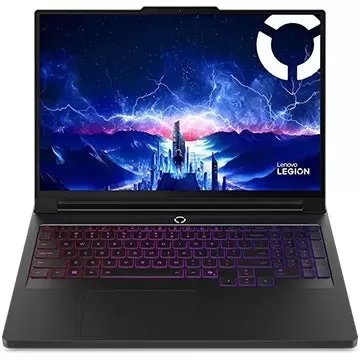"Preorder Lenovo Legion Pro 7i Gen 10 RTX 5080 for 2025"
Lenovo has just launched preorders for its highly anticipated 2025 model, the Lenovo Legion Pro 7i Gen 10 gaming laptop. This beast of a machine comes loaded with top-tier specifications, including the latest Intel processor and Nvidia graphics card, a stunning high-resolution OLED display, and generous amounts of RAM and SSD storage right from the start. Although it's still listed as a preorder, some units are already shipping with expected deliveries as early as late April.
New Release: Lenovo Legion Pro RTX 5080 Gaming Laptop

Lenovo Legion Pro 7i Gen 10 16" 2560x1600 OLED Intel Core Ultra 9 275HX RTX 5080 Gaming Laptop with 32GB RAM, 2TB SSD
$3,599.99 at Lenovo
The Lenovo Legion Pro 7i boasts a 16-inch 2560x1600 resolution display with a 240Hz refresh rate on an OLED panel, powered by an Intel Core Ultra 9 275HX CPU and an Nvidia GeForce RTX 5080 GPU. It also features 32GB of DDR5-6400MHz RAM and a spacious 2TB (2x1TB) SSD storage setup. The Intel Core Ultra 9 275HX offers a significant leap in performance over the Core Ultra 9 185H found in previous models, which prioritized energy efficiency. This new processor is a true powerhouse and pairs excellently with the GeForce RTX 5080 mobile GPU.
The Legion Pro 7i Gen 10 is packed with modern features, including WiFi 7 and Bluetooth 5.4 support, USB Type-C with up to 140W Power Delivery, Thunderbolt 4 with DisplayPort 2.1 (40Gbps), and a USB Type-A port with USB 3.2 Gen 2 specification. It retains an RJ45 ethernet port, which is increasingly rare, and includes a privacy shutter for the webcam. The durable chassis is constructed from aluminum and magnesium, ensuring a premium feel.
We've Reviewed an RTX 5080 Equipped Gaming Laptop
While we haven't yet tested the latest Lenovo Legion Pro 7i, we have evaluated a gaming laptop with the RTX 5080 GPU. The RTX 5080 shows only a marginal improvement over the RTX 4080 in terms of raw rasterized performance but significantly outperforms it when DLSS 4.0 with multi-frame generation is supported by the game. The Gigabyte Aorus Master laptop, equipped with an RTX 5080 at a 150W TGP and a 2560x1600 display, offers similar performance to what we can expect from the Lenovo Legion Pro 7i, which shares the same TGP and display resolution.
Gigabyte Aorus Master 16" RTX 5080 Laptop Review by Chris Coke
"Here's the thing: Nvidia hasn't been shy about tying the 50-series to its AI capabilities rather than pure native rendering performance. Though the RTX 5080 performs disappointingly close to the RTX 4080, this gap narrows significantly when you're playing games that support multi-frame generation. While 'fake frames' have become a bit of a meme, the fact is that when it works, it's pretty amazing and dramatically improves performance. This varies game by game based on how well it handles latency. For instance, Alan Wake 2 can feel a bit more laggy at higher multiplier settings, whereas Cyberpunk 2077 does not. With this technology and others, like neural shaders, coming to future games, there's an argument to be made about buying into these future technologies. However, you’re buying on a promise while Nvidia and game developers work to add support to new and existing games."
-
If you love high-impact anime-style ARPGs, the newly launched Crystal of Atlan is perfect for you! It blends stylish real-time combat with deep character progression in a world of magic and technology. Featuring fast-paced battles, weapon customizatiAuthor : Christian Jan 08,2026
-
Schedule I faces copyright infringement allegations, but unexpectedly, fans have retaliated by review-bombing the accuser's games. Explore the details of this controversy and what's next for Schedule I's development.Latest Developments: Schedule ISteAuthor : Allison Jan 08,2026
-
 Fun Card PartyDownload
Fun Card PartyDownload -
 Callbreak Master 3 - Card GameDownload
Callbreak Master 3 - Card GameDownload -
 Futa Concoction– Pat 2Download
Futa Concoction– Pat 2Download -
 Super Texas Poker--Best Free Texas Hold'em pokerDownload
Super Texas Poker--Best Free Texas Hold'em pokerDownload -
 Clash IslandDownload
Clash IslandDownload -
 Flight Pilot: 3D SimulatorDownload
Flight Pilot: 3D SimulatorDownload -
 Word SwipeDownload
Word SwipeDownload -
 My School Is a Harem (v0.33)Download
My School Is a Harem (v0.33)Download -
 Boomstar - Piano Music MasterDownload
Boomstar - Piano Music MasterDownload -
 Lazy JumpDownload
Lazy JumpDownload
- Black Ops 6 Zombies: How To Configure The Summoning Circle Rings on Citadelle Des Morts
- Harvest Moon: Lost Valley DLC and Preorder Details Revealed
- Roblox: Latest DOORS Codes Released!
- Silent Hill 2 Remake Coming to Xbox and Switch in 2025
- Roblox: Blox Fruits Codes (January 2025)
- Roblox: Freeze for UGC Codes (January 2025)








![Taffy Tales [v1.07.3a]](https://imgs.ehr99.com/uploads/32/1719554710667e529623764.jpg)




